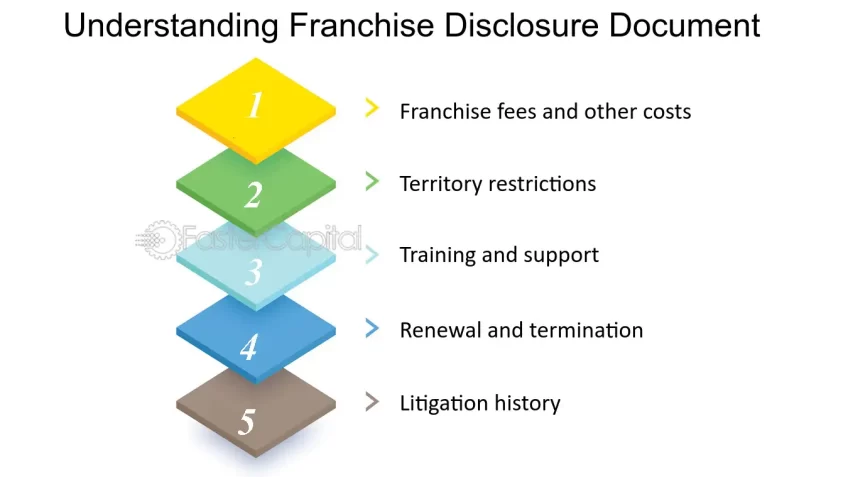A franchise broker acts as an intermediary between a franchisor, a company that allows individuals to run businesses under its brand, and a franchisee, an individual or company who operates a business under the franchisor’s brand. The broker’s main role is to guide a potential franchisee through the process of owning a franchise, ensuring both parties reach a mutually beneficial agreement. Essentially, the broker is a conduit providing information, guidance, and resources to streamline the franchise buying process.
The understanding of the Franchise Disclosure Document (FDD) is critical in the franchise industry. This legally required document offers an overall blueprint of a franchise, detailing information about the franchisor, the franchise system, and the agreements that potential franchisees will need to sign. It provides a thorough review of the franchisor’s financial state, obligations, franchise costs, as well as the rules governing the franchise. While this document is exhaustively detailed, it can be overwhelming due to its legal and financial complexities. This is where a franchise broker can significantly aid in understanding and interpreting the FDD.
The Role of a Franchise Broker
A franchise broker serves as a resource for potential franchisees, helping them understand the often perplexing industry of franchise opportunities. They are responsible for assisting prospective franchisees in identifying and evaluating potential franchise opportunities that best align with their business goals, financial capabilities, lifestyle, and overall compatibility. This involves analysis, due diligence, and facilitating conversations between the potential franchisee and the franchisor. In essence, a franchise broker is a trusted advisor, mentoring and guiding franchisees through the complexities of the franchising process.
A franchise broker also assists potential franchisees in gaining a full understanding of the franchisor’s Franchise Disclosure Document (FDD). Given the legal, financial, and operational complexities of the FDD, the interpretation and understanding of it can be a daunting task. This is where a franchise broker truly exhibits their value. They help decipher the language used in the document, present real-world implications of certain clauses, and guide the franchisee on what to pay particular attention to. They also play a key role in facilitating discussions between franchisees and franchisors, ensuring the former grasp all the requirements and responsibilities stated in the FDD. Such assistance not only reduces potential pitfalls but also arms the potential franchisee with the confidence and awareness necessary to succeed.
Franchise Disclosure Document
The Franchise Disclosure Document (FDD) is a legally mandated document that every franchisor must provide to prospective franchisees before a deal is finalized. The document carries a thorough overview of a franchisor’s business, its financial health, any legal issues, costs related to starting and running the franchise, responsibilities of both the franchisee and franchisor, rules and regulations governing the franchise and other critical information that a franchisee must know before making an investment. The Federal Trade Commission (FTC) in the United States introduced the concept of the FDD back in the 1970s to ensure transparency in franchising and to protect prospective franchisees.
The standard FDD has 23 sections, or “Items”, each covering a different aspect of the franchise. These range from the history of the franchisor and initial and ongoing costs to obligations of franchisor and franchisee and any financing arrangements. While all sections are necessary for potential franchisees to review, there are key areas within the FDD on which they should focus. Among these are the franchisor’s financial statements, litigation and bankruptcy histories, estimated initial investment, and the responsibilities of the franchisor and the franchisee. These sections provide invaluable information that can heavily influence the investment decision. However, the vastness and complexity of the FDD might create a challenge for potential franchisees. This is where the expertise of a franchise broker becomes vital for a seamless FDD understanding.
How a Franchise Broker Can Help You Understand the FDD
A franchise broker plays a significant role in helping potential franchisees dissect and fully comprehend the Franchise Disclosure Document (FDD). Brokers with their experience and specialized skill set can break down the intimidating 23 section document into manageable and understandable segments. They highlight key areas, such as financial statements and franchisor obligations that need thorough evaluation and can have a large impact on the potential success of the franchise. This enables the prospective franchisee to make a more informed and conscious decision about buying the franchise.
A tangible illustration of this can be seen in the way a franchise broker might take a potential franchisee through the financials section of the FDD. The broker not only helps decipher the numbers but also guides the investor in benchmarking these figures against industry standards. They can broker sensitive conversations between the potential franchisee and franchisor around areas of concern within the document. By easing the process of understanding the FDD, franchise brokers help potential franchisees avoid misinterpretations that could lead to significant challenges down the line.
The process of understanding a Franchise Disclosure Document (FDD) can be a daunting task for potential franchisees. With the expertise and guidance of a seasoned franchise broker, the knowledge that the FDD contains becomes more accessible and less overwhelming, guiding franchisees towards more informed and successful franchising decisions.







